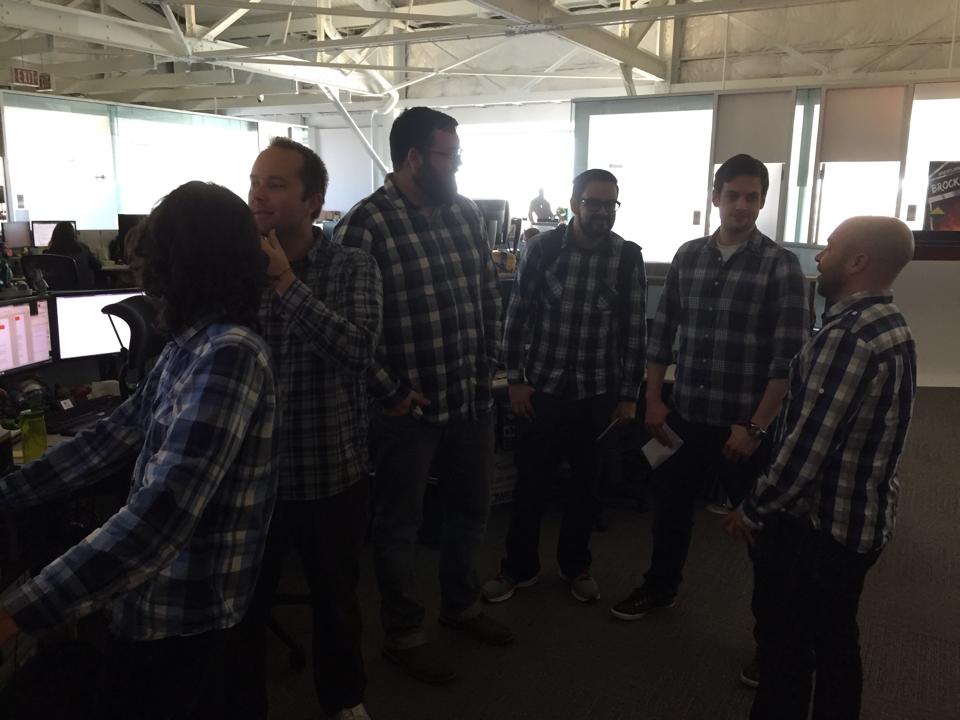Guardian Article
I hope gaming slowly starts to evolve into a more inclusive place for women
Most professions have a uniform of some kind, whether it’s the suit and tie of corporate culture, or the brand-asserting mono-wear of the world’s major retail outlets. Sometimes, however, dress codes can be much more insidious. In the world of video games, a young creative industry that seeks to assert its rebelliousness and vibrancy, we aren’t required to conform through necessity or tradition. But one thing I discovered very quickly when I started working here is that there is a uniform: it’s just that this one is the result, not of workplace rules, but of a lack of diversity. And it can be just as excluding.
It was the night of my very first launch party. I’d just finished my internship at a video games TV channel and I was going through the familiar routine of choosing an outfit. In other words I was trying on everything in my own wardrobe as well as the wardrobes of all my flatmates. I eventually decided on something I’d been saving for a special occasion: a patterned mid-length dress with black panels down the side. I sent a photo of it to the colleague who’d invited me, but her replied surprised me: “It’s lovely, but a bit too dressy for tonight.” I wore it anyway.
When we arrived at the event, I realised straight away that she was right. I was greeted with a sea of plaid and denim, amid which you could sometimes pick out the odd T-shirt, usually bearing a video game or movie reference so obscure only the wearer and four of their friends would ever understand it. There were barely any women there, and most of those were publishers or in marketing, rather than developers. I felt like a lone speck of femininity in a musty fog of identikit men.
The white guy in checked shirt, jeans and trainers. Possibly with a beard. It’s the joke we often make about the industry, but there is plenty of truth in the stereotype.
I entered the games industry as a 19-year-old woman, facing a professional environment dominated by men. In its 2014 workplace study, the International Game Developer Association found that the number of women in the industry has doubled in the past five years, but it still stands at just 22%. And at industry events it can feel like a lot less. I was acutely aware of standing out, the clothes I liked to wear didn’t fit in with the consensus of casual boyishness. Consequently, I found myself consciously wearing more androgynous outfits, my dresses and skirts were pushed to the back of the wardrobe, and I started choosing plainer clothes that I wouldn’t have really considered before. Goodbye beloved floral A-line dress, hello plain black T-shirt.
As a woman who often appears in front of camera I was particularly self-conscious of choosing anything that could be considered “sexy”. I was once told by a seasoned industry professional that they were reluctant to let myself and a female colleague stream video together as they didn’t want to look like they were “selling sex”. Somehow, internet commenters started to have an influence – they made me think that my body wasn’t something that belonged to me, but to those who looked at me. The way to combat that was to tone down the way I dressed. To be taken seriously as a video games journalist, I had to avoid looking “sexy” or “girly”.
It’s taken me over a year, along with meeting and befriending other inspirational women in the industry, to realise that changing my style so that I can fit in is wrong. A uniform implies control and regimentation, and this is a young and creative industry, where those constraints should not apply. Indeed, we are lucky to be part of a culture that is still forming its own identity – that can be a wonderful thing. We joke about the stereotypical games industry look, but we need to be aware that it is the product of a lack of diversity, both in terms of gender and ethnicity – as such it can seem just as exclusionary as the tailored suit and tie of the professional world.
Of course, I’m not saying that the whole industry needs a makeover, but it has to be more welcoming toward different concepts of style and identity. Creativity begins with how we feel and how we see and present ourselves as people. This industry isn’t just dressing identically, it draws its inspiration from the same music, movies and books. This homogeneity leads to staid ideas.
I now happily wear my floral A-line dress to video game events, and yes, I do stand out, but that’s fine. In an industry that lacks it, difference is a good thing to have.
I hope gaming slowly starts to evolve into a more inclusive place for women

